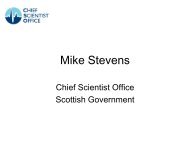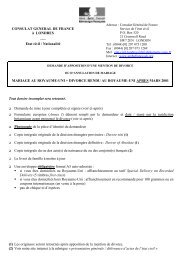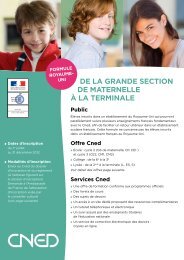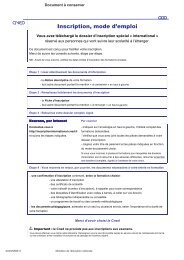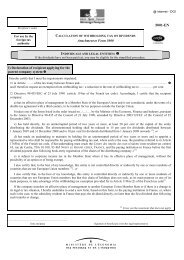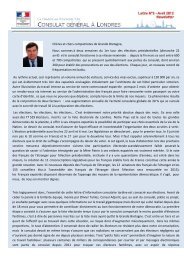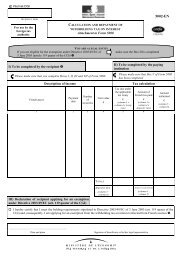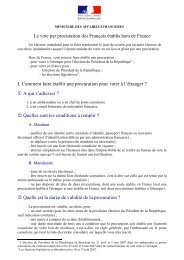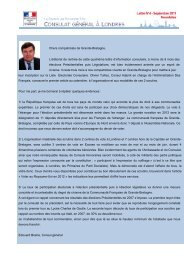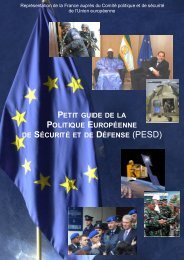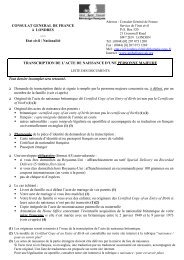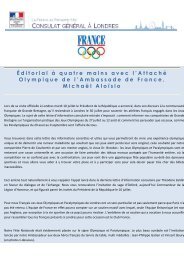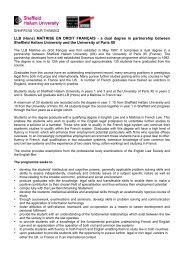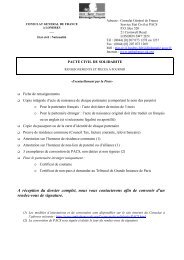Draft Outline For Responsible Innovation Workshop, April / May 2011
Draft Outline For Responsible Innovation Workshop, April / May 2011
Draft Outline For Responsible Innovation Workshop, April / May 2011
You also want an ePaper? Increase the reach of your titles
YUMPU automatically turns print PDFs into web optimized ePapers that Google loves.
Franco-British workshop on responsible innovation London, 23-24 <strong>May</strong> <strong>2011</strong><br />
and commissioning research in these areas. He represents ESRC on the Cross-Council Nanotechnologies<br />
Coordination Group.<br />
Nicola GOLDBERG<br />
Portfolio Manager, EPSRC (Engineering and Physical Sciences Research Council)<br />
Nicola Goldberg has worked at the Engineering and Physical Sciences Research Council (EPSRC) for 5 years,<br />
most recently in the Nanotechnology and Healthcare Programmes. She currently coordinates EPSRC’s<br />
<strong>Responsible</strong> <strong>Innovation</strong> activity which has included a pilot study on how <strong>Responsible</strong> <strong>Innovation</strong> could be<br />
operationally implemented within our research funding activities.<br />
Alexei GRINBAUM<br />
Researcher - CEA-LARSIM - Saclay<br />
Alexei Grinbaum is a researcher at CEA-LARSIM located in Saclay near Paris. His main interest is in the<br />
philosophy of physics and the foundations of quantum mechanics. Since 2003 he has also been working on the<br />
ethical and social aspects of nanoscience and nanotechnology. Grinbaum's early publications in this area focus<br />
on the uncertainty of technological progress and the problem of governance, including a critique of the<br />
precautionary principle ("Living With Uncertainty: Toward a Normative Assessment of Nanotechnology",<br />
Techné 8(2):4-25, 2004), and on public perception of nanotechnology ("Cognitive Barriers in Perception of<br />
Nanotechnology," Journal of Law, Medicine and Ethics, 34(4): 689-694, 2006). His later work bears on the<br />
question of narratives of nanotechnology ("The Nanotechnological Golem", Nanoethics, 4(3):191-198, 2010).<br />
He is a coordinator for France of the European observatory of nanotechnology, where his principal<br />
contribution is the Toolkit for Ethical Reflection and Communication on Nanotechnology<br />
(http://www.observatorynano.eu/project/catalogue/4ET).<br />
He is a frequent speaker at public debates on nanotechnology and science & society conferences both in<br />
France and internationally.<br />
Richard HANDY<br />
Director of the Ecotoxicology Research and <strong>Innovation</strong> Centre - University of Plymouth<br />
Professor Richard D. Handy is a fish toxicologist and comparative physiologist with 20+ years experience and is<br />
the Director of the Ecotoxicology Research and <strong>Innovation</strong> Centre at the University of Plymouth. The centre<br />
has a strong theme on nanoscience: (http://www.plymouth.ac.uk/research/eric). Professor Handy has<br />
published over 100 papers and book chapters on fish ecotoxicology, including about 20 papers on<br />
nanomaterials in the last 3 years. Prof. Handy is expert on the dietary uptake of contaminants in fish including<br />
methods for making diets containing nanomaterials, and protocols for in vivo exposure from the food. He is<br />
expert on epithelial biology/unstirred layer chemistry and the role of mucus in uptake across membranes; and<br />
has detailed expertise on membrane transport systems and mechanisms of uptake. His laboratory is<br />
recognised for in vitro organ perfusion techniques for measuring uptake (e.g. gut and gill perfusions in fish,<br />
other organs in mammals) and he is an expert histopathologist with an extensive archive of nanopathologies<br />
from different animals, and unique expertise on brain pathologies from nanomaterials in fish. His laboratory is<br />
currently investigating TiO 2 , Cu-NPs, Ag-NPs, SW-CNT, and C 60 . His work is supported by national level grants<br />
(e.g., Natural Environment Research Council, UK) and in EU partnerships (e.g., NanoImpactNet). He has written<br />
several reviews on manufactured NPS, edited special issues, reported on test methods to the UK government<br />
(founder member of the UK task force), and via the OECD working party on nanomaterials. He also has a<br />
clinical research programme that includes cardiotoxicology, and more recently the risks of nanomaterials in<br />
dentistry.<br />
Pierre-Benoît JOLY<br />
Economist and sociologist, Directeur de recherche at the National Institute of Agronomic Research (INRA)<br />
Pierre-Benoît Joly, economist and sociologist, is Directeur de recherche at the National Institute of Agronomic<br />
Research (INRA) in France. He holds a degree in agronomy (1982), a PhD in economics (1987) and the<br />
“Habilitation à diriger les recherches” (1995). He is the Director of the IFRIS (French Institute for Studies of<br />
Research and <strong>Innovation</strong> in Society).<br />
9



